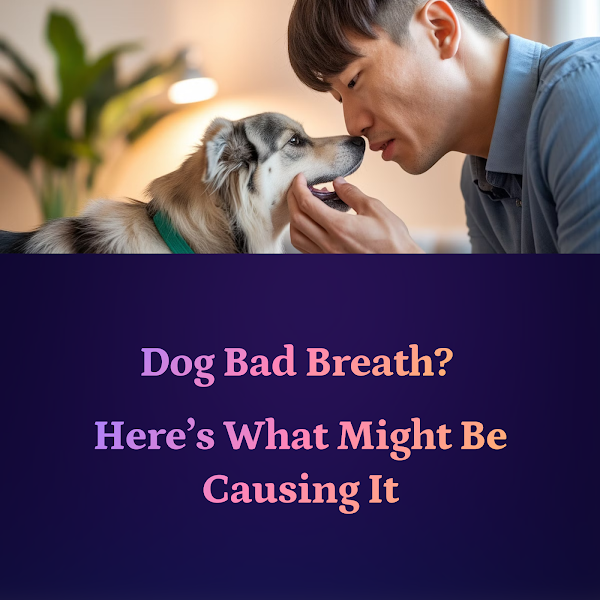Dog Bad Breath? Here’s What Might Be Causing It
Introduction: Why Your Dog's Breath Matters
Have you ever leaned in for a snuggle with your furry best friend only to be greeted by a smell that makes you recoil? You're definitely not alone.
Bad breath in dogs isn't just an unpleasant inconvenience—it's often a warning sign that something more serious might be happening with your pup's health.
As a loving pet parent, understanding what causes that stinky dog breath is the first step toward helping your canine companion live a healthier, more comfortable life. Dental health is a crucial part of your dog's overall wellbeing, yet it's something many of us overlook.
In this comprehensive guide, we'll explore everything you need to know about dog halitosis—from identifying the underlying causes to finding effective solutions that will have your pup's breath smelling fresher in no time.
| Common Causes | When to Worry |
| Dental Disease | Sweet or Fruity Breath |
| Poor Diet | Excessive Drooling |
| Oral Infections | Difficulty Eating |
| Digestive Issues | Pawing at Mouth |
Let's dive deeper into what might be causing your dog's bad breath and discover practical solutions that work. Understanding the root cause is essential for effective treatment.
🦷 Common Causes of Dog Bad Breath
When it comes to understanding your dog's bad breath, identifying the underlying cause is crucial for effective treatment.
The most prevalent cause of bad breath in dogs is periodontal disease, which affects nearly 80% of dogs by the age of three.This dental condition develops when plaque and tartar accumulate on your dog's teeth, leading to inflammation and infection.
Your dog's diet choices can significantly impact breath odor. Low-quality dog food often contains fillers and artificial ingredients that not only affect digestion but can leave residual odors in the mouth. Upgrading to premium dog food with natural ingredients might make a noticeable difference.
🚨 Sometimes bad breath indicates more serious systemic health issues. Kidney disease often produces a urine-like odor, while diabetes might cause sweet or fruity-smelling breath. These conditions require immediate veterinary attention.
Did you know that certain breeds are more susceptible to dental problems? Small breeds like Yorkies, Chihuahuas, and Dachshunds typically have more crowded teeth, creating perfect hiding spots for bacteria. These breeds benefit from more frequent dental care routines.
Even something as simple as your dog's chewing habits can affect breath odor. Dogs who regularly chew appropriate toys tend to have cleaner teeth and fresher breath.Dental chews and toys can help reduce plaque while satisfying your dog's natural urge to chew.
| Dental Issues | Diet Problems | Medical Conditions |
| Tartar buildup | Low-quality food | Kidney disease |
| Gum disease | Food allergies | Liver problems |
| Broken teeth | Table scraps | Diabetes |
| Oral tumors | Dietary indiscretion | Sinus infections |
Conclusion: Fresh Breath, Happy Dog
Taking care of your dog's dental health isn't just about eliminating bad breath—it's about improving their overall quality of life. Regular dental care can add years to your pet's life.
Remember that prevention is always better than treatment. Establishing a consistent dental care routine early in your dog's life will save both of you from discomfort and potentially expensive veterinary procedures down the line.
By understanding the causes behind your dog's bad breath and taking proactive steps to address them, you're not just solving an unpleasant odor problem—you're making a significant contribution to your furry friend's long-term health and happiness.Your effort makes all the difference!
| Frequently Asked Questions | |
|---|---|
| How often should I brush my dog's teeth? | Ideally, you should brush your dog's teeth daily. If that's not possible, aim for at least 2-3 times per week. Consistency is key to preventing plaque buildup. |
| Can certain foods improve my dog's breath? | Yes! Fresh vegetables like carrots and celery act as natural toothbrushes. Probiotics can also help balance gut bacteria, which can improve breath odor from the inside out. |
| At what age should I start brushing my dog's teeth? | Start as early as possible, ideally when they're still puppies. This helps them get accustomed to the routine and prevents dental issues from developing. |








Comments
Post a Comment